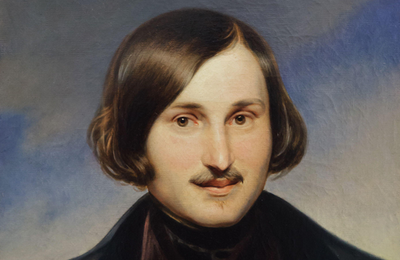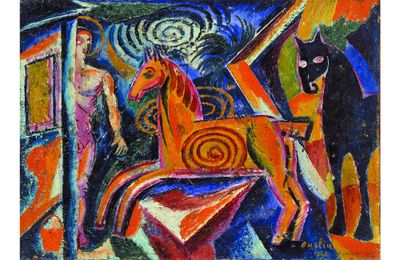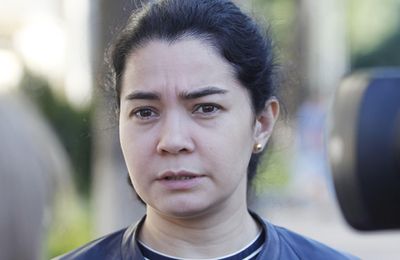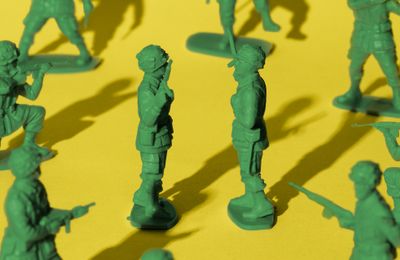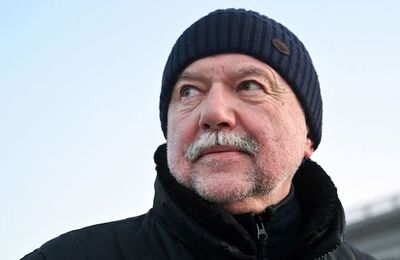“Do you mind not speaking Russian?” The tobacconist cut me off abruptly, his voice catching with anger. “I am so fucking sick of Russian.” I’d tried to speak to him in my rudimentary Ukrainian, but it had brought an uncomprehending stare, so I’d switched. Everyone can in Ukraine, where bilingualism is the norm. But this was Lviv, a thoroughly Ukrainian- speaking city, and it was six months into Russia’s full-scale invasion of the country. Of course this guy was sick of Russian.
As in so many colonial struggles, language is at the heart of Ukraine’s attempt to free itself from the stifling and frequently deadly embrace of its larger neighbour. Until the invasion of 2014, establishing Ukrainian as the first language was almost unthinkable—despite the committed work of writers and poets to raise the profile of their mother tongue.
Like the frenetic and doomed generation of the 1920s avant-garde, these writers tried to destroy the pernicious myth—central to Moscow’s colonial story—that the Ukrainian language was “less than” Russian: less complex, less academic, less intellectual. Versions of the myth remain alive over what was once its vast empire. The “great and mighty” Russian language is meant to unite all these “brotherly peoples”, giving them access to this lofty culture, to Dostoevsky and Pushkin, even—the chauvinists say, if they forget themselves—to civilisation itself!
I heard as much in Moscow, where I studied previously. “It’s a shame,” one proud and educated Muscovite lamented, on the topic of young Georgians rejecting Russian for their native tongue. “Speaking Russian gave them access to Moscow’s universities! To all that culture and learning!” In her version of the world, Moscow is the pinnacle of all human endeavour, and the people of its former empire—whether imperial or Soviet—only stand to gain by being part of the Russkiy Mir (Russian world). The imposition of the Russian language across one-sixth of the world’s landmass was, she would argue, a gift.
Only in Russia does this view still dominate. All over that former empire people are drifting back to their native languages: Kazakh, Kyrgyz, Georgian. But it’s a difficult transition after heavy decades, or centuries, of domination. In Ukraine, the native language was long banned, repressed, kept to the village and the home. To get ahead, until relatively recently, you were better off speaking Russian, the language of business, commerce, job adverts.
That changed with the start of the war in Donbas, nine years ago—and with the election of leaders interested in strengthening Ukrainian nationhood. New laws were introduced, blunt tools to get Ukrainian onto an equal footing, which resulted in newspapers, cinemas and street names switching language. This was spun by the Kremlin as “repression of Russian speakers”. Some in the east of Ukraine, receiving Moscow’s propaganda on TV, agreed. And so a few more chisel marks were made in the division between Ukraine’s east and west, which Russia has for so long exploited and encouraged.
Many Ukrainians were switching, studying the language, before the war. Polls in 2012 found nearly half giving Russian as their first language; by 2021, the number was down to 21 per cent.
Then came the full-scale invasion, the occupations, the horrors of Bucha and Mariupol. Again and again during the war in Ukraine, I’ve been told: “Now we see Russians for what they really are.” The people telling me this have been old sailors from Odesa, retired academics and engineers from Kharkiv: people whose entire lives were bound up with Russia, who travelled there frequently, who have family across the border. We spoke Russian in these conversations, but it was beginning to feel, for some in this older generation too, uncomfortable.
As for the younger Ukrainians, my friends in their thirties, the question is closed. “I don’t speak it any more,” one woman told me flatly, as we walked down Odesa’s grand, cobbled boulevard one serene evening. For her there is nothing good from Russia and there are no good Russians. At the book market nearby, an art poster summed up her feelings: pasted onto the cover of a prestigious Russian textbook was a giant, revolting, white-spotted tongue, and the (English) words: TOXIC, TOXIC, TOXIC. Often as not, younger people can’t bring themselves to use Russian, the language of the oppressor, of the rapist and the murderer. In cafés and bars in the west of Ukraine, posters urge you to “make the switch” or sternly forbid Russian on the premises. Impromptu Ukrainian classes for refugees escaping the war-torn east have sprung up everywhere.
But what about the east? There, the divisions that have crippled this country and on which Putin’s bloody rhetoric is built become sharper. Language can be a thorny topic.
“Many believe that those who remain Russian speakers could betray them,” a teacher in Kharkiv told me (in Russian). Ukraine is, at the moment, a suspicious country, and not without reason. There are frequent news reports of the intelligence services arresting people suspected of sharing information about strikes or military locations with the invaders; and stories of those in occupied territories who, brainwashed by years of propaganda, hoped the Russians would bring better pensions and better living conditions.
In a grim euphemism, they’re referred to as the “ones who waited”. I’ve met them, and interviewed them. “It’s all the fault of the people who shouted on Maidan,” one bitter old woman from Donbas told me, as she travelled on a westbound train for medical treatment, in May last year. The people seated around us silently glared at her. Another woman on that journey told me of her neighbours, sitting in the basement, “waiting for Russia”. “What would you like to say to them?” I asked. “I’d like to punch them in the nose,” she replied promptly. I didn’t doubt her sincerity.
Pro-Kremlin voices in the west often cite the fact that a majority of people in Donbas, the region spanning Luhansk and Donetsk oblasts, speak Russian. But speaking Russian does not make you Russian or pro-Russian. Any understanding of this country’s history tells you that.
Kramatorsk is a gritty steel mill city that became de facto regional capital after the occupation of Donetsk. In April this year, with the battle for Bakhmut raging just 30km away, it was a difficult place to be, with constant air-raid sirens and deadly missile strikes interrupting and destroying life, as its 80,000 remaining inhabitants tried to maintain some sort of normality.
I sat with Oleksandr and Aleksandra—Sasha and Sasha—in a city-centre office that doubled as a humanitarian aid point. Both are activists, knowledgeable about their region, and fiercely proud of Donetsk and especially of their city.
Aleksandra used the word kasha (porridge) to denote the jumble of ethnicities that has resulted from decades of industrial development in the region. There were German and Welsh factory-owners and Russian landowners whose names are still visible on the map, and vast numbers of Russians were lured by lower taxes to toil in the machine factories, mills and mines of this resource-rich river basin. Aleksandra’s Russian grandmother came in the 1950s, and though schools then taught Ukrainian, “ethnic” Russians like her mother were exempt from these classes. This is why, she explained, older people in the east “understand Ukrainian but don’t always speak it”.
But there is a darker part of this history. Around four million people in the wheat-producing regions of Ukraine died in the man-made famine in the 1930s. The sombre Kyiv museum to this Holodomor recounts how the authorities then brought in tens of thousands of people from Russia and Belarus, who were given the land and houses of those who had died of hunger. Mass resettlement, the shifting of entire ethnic groups, was a key feature of the Soviet era. The consequences are felt many generations on.
In the east, the divisions on which Putin’s bloody rhetoric is built become sharper
For Aleksandra, though, the melting pot has resulted in a broad-minded acceptance of others. “I don’t think there’s a separate Donetsk identity,” she reflected. “Instead, it’s about tolerance.” A fluent Ukrainian speaker, she said she still needs her native Russian to express “some complex or deep thoughts”. Not because one language is superior to the other, but because one is her mother tongue and the other is not. This, surely, does not make her any less Ukrainian.
In fact, she was one of many who made the journey west last year but came back east again. With the distant thud of explosions audible on that day in Kramatorsk, this decision may be hard for some to fathom. But Aleksandra could find no work in the west of the country. “My life turned into some kind of incomprehensible quagmire, doing nothing but chasing humanitarian aid,” she recalled, adding that she lived crammed in alongside many other refugees. She tried at all times to speak Ukrainian, especially while in the countryside: “On the one hand to avoid any questions. But on the other, as a mark of respect for the people who are helping you, who took you in.”
I’ve seen, just under the surface, a hostility to Russian speakers in cities like Lviv. It’s fair enough when it’s directed at me; as a foreigner, I should learn Ukrainian (and am doing so, laboriously). But even towards refugees from the east I noticed a strange coldness sometimes, as people awkwardly apologised for speaking Russian and got silence in response.
It’s a common joke that Putin—in trying to recreate his beloved empire by force—managed both to unite Ukraine and make the “mighty” Russian language a toxic remnant of the past. The sailor from Odesa told me this, with a wink, as we talked on the Romanian border a few days into the invasion. “Molodets, Putin!” (“Well done, Putin!”) he enthused.
But like all national narratives, neither of Putin’s supposed self-destructive achievements is quite true. The Russian language is not gone yet; the Kharkiv teenagers outside my flat joke around in Russian, and Odesa’s irrepressible humour isn’t always expressed in Ukrainian.
And unity? Every nation is complicated and messy, no matter how clear-cut we try to make them. Since the 2013 revolution, Ukraine has leaned towards a civic rather than an ethnic nationalism–it is undeniably the case that a more inclusive understanding of who belongs, of what Ukraine can and should be, has been prevalent since Maidan. But this sits awkwardly alongside an ugly right-wing nationalism.
Does fighting a brutal battle for survival against Russia make one or the other of those nationalisms more likely to prevail? I haven’t heard a persuasive answer to that question, but if Ukraine’s linguistic and geographical divides are to be healed, it will be down to those in authority to lead the way. Arguably, Ukraine’s strongest weapon against Russian aggression is indeed its unity—especially between its east and west. Even when the guns fall silent, the Kremlin may be ready to keep chiselling at those differences, spreading its poison of propaganda,resentment and separatism. Surely the best defence is that overriding principle of acceptance that, for Aleksandra, comes from the kasha of Donetsk.





